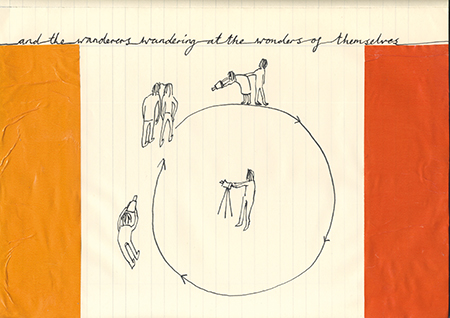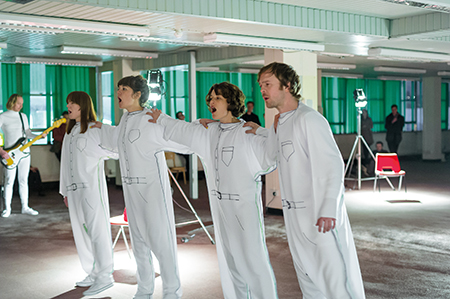
In both title and content, Alice Theobald’s recent video work, and the wanderers wandering at the wonders of themselves (2015), accesses a situation that is already in full flow. There is no establishing shot, no exposition of what the ‘and’ of the title is a conjunction for. Circling a camera that keeps apace with their movement, a young man and woman – friends, relatives or lovers, perhaps – amble, their conversation out of earshot. They pull into one another, while pushing us out, as they trace an invisible territory around east London’s Gillett Square.
Now and then, the image cuts from its pivot to alternate in a game of shot/reverse shot between the cameras that follow the couple along their path. Theobald told me that it’s essential her subjects be recognizably contemporary, identifiable with a period not only by dress but also by comportment and gesture. This ethnographic specificity, as with many of Theobald’s works, reflects the glissando-like shifts between individual and society that bear upon identity. If wandering implies a desiring drift, the two protagonists are stuck on a circuitous path, caught between productive repetition and stagnating routine, autonomy and rule. The camera’s rotating eye, an organizing centrifugal force, is reminiscent of John Smith’s influential The Girl Chewing Gum (1976) – a film that marshals action before it occurs and was made in the same neighbourhood almost 40 years earlier. Like Smith, Theobald understands how expectation can be at once deeply funny and strangely abject.
Theobald is fascinated by the division between appearance and authenticity, which is never more evident than in humans, towards whom her work expresses an absurdist empathy – as towards a chaotic old friend. ‘I’m trying to communicate something about the struggle of communication, of representing something, like thoughts into language or thoughts into action,’ Theobald has said. In this respect, acting presents something of a dilemma. The actor (whose job it is to be a ‘fake’ person), the script (which directs action) and the rehearsal (which finesses the falsity) are employed in works such as They Keep Putting Words in My Mouth! An Operetta of Sorts (2013), I’ve Said Yes Now, That’s It (2014) and Mike Check (2013). The latter, originally installed at the Royal Academy of Arts Schools, where Theobald studied, features a video, partly soundtracked by the artist’s band Ravioli Me Away, in which Theobald, vampishly chic, channels a cliché familiar to silver screen and soap-star female hysterics: ‘I just want to know the truth. Just tell me the truth, Mike. You keep going round in circles and you keep repeating yourself. I just want to know the goddamn truth.’ With each rehearsal, an off-screen male voice directs her delivery. Yet, his power is displaced when she talks back, in turn directing him on how he should direct her.

First shown at Pilar Corrias, London, in 2013, the three-screen installation and performance work They Keep Putting Words in My Mouth! An Operetta of Sorts uses therapeutic models to examine actor/director and audience/performer relations. Projected above a theatrically lit empty circle of chairs – the vestige of a group-therapy session – three videos show performers (including Theobald) rehearsing, the documentation of a final performance that has occurred inside this circle of chairs, and the libretto, which is performed karaoke-style. On the screen that documents the rehearsal, a conversation between Theobald and a therapist simultaneously reflects upon and anticipates on-screen action as it occurs in the final performance. Transparency about the process reveals her fallibility. The therapist’s searching voice here becomes a proxy for the director’s in Mike Check: whether delivered to camera or to a group, Theobald’s words become actions through the mediation of male authority figures. In the performance I’ll Finally Lose the Plot (2014), two manic characters – one male and one female – who both drink and smoke too much, preside over a storyline in which losing the plot is the plot. First installed as part of the artist’s degree show at the Royal Academy of Arts Schools, in a room padded with duvets, the work elides the institutions of art, mental health and domesticity.
For the live musical score she staged at the Chisenhale Gallery in London last year, I’ve Said Yes, Now That’s It, Theobald delivered a quasi-sociological manifesto on the individual and the group, freewill and autonomy, which she interspersed with directions for five marionette-like performers. She announced shifts in the score and the performers’ actions moments before they occurred, but also granted the performers the opportunity to contradict the gnomic refrains she set in motion: ‘I wanna meet somebody like me,’ they sang; then, when instructed, they chanted: ‘I wanna meet nobody like me.’ Plaintively optimistic, this transfixing performance plotted a rich abstract diagram of separation and dependency.
Much like the therapeutic process, Theobald’s work rehearses situations unfolding in structured real-time, using reflection, repetition and anticipation to get a handle on motivation and narrative. Inside the therapeutic circle of They Keep Putting Words in My Mouth! An Operetta of Sorts, performers sing ‘ha ha ha’, which is followed by its inverse, ‘ah ah ah’. Laughter, here, is the flipside to revelation and fear. Repetition may be abject, but its anticipation is also key to humour. It’s a mad tryst well understood by Theobald.
